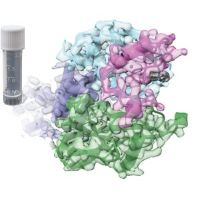Specification
| Description | Recombinant protein from the full-length sequence of Homo sapiens GSK3B interacting protein (GSKIP), transcript variant 2 (NM_016472). |
| Organism | Homo sapiens (Human) |
| Expression Host | Human Cells |
| Tag Info | His or DYKDDDDK. Please contact us if you need further information or require specific designed tag. |
| Purity | Greater than 90% by SDS-PAGE gel |
| Uniprot ID | Q9P0R6 |
| Entry Name | GSKIP_HUMAN |
| Gene Names | GSKIP C14orf129 HSPC210 |
| Alternative Gene Names | C14orf129 |
| Alternative Protein Names | GSK3B-interacting protein (GSKIP) (GSK3beta interaction protein) |
| Application | Antigens, Western, ELISA and other in vitro binding or in vivo functional assays, and protein-protein interaction studies; For research & development use only! |
| Buffer | Purified protein formulated in a sterile solution of PBS buffer, pH7.2, without any preservatives |
| Endotoxin | Endotoxin level is < 0.1 ng/µg of protein (<1EU /µg) |
| Length | 139 |
| Molecular Weight(Da) | 15648 |
| Protein Sequence | (The sequence of expressed protein may have some variation from the sequence shown below. Please contact us for the exact sequence.) METDCNPMELSSMSGFEEGSELNGFEGTDMKDMRLEAEAVVNDVLFAVNNMFVSKSLRCADDVAYINVETKERNRYCLELTEAGLKVVGYAFDQVDDHLQTPYHETVYSLLDTLSPAYREAFGNALLQRLEALKRDGQS |
Background
| Function | FUNCTION: A-kinase anchoring protein for GSK3B and PKA that regulates or facilitates their kinase activity towards their targets (PubMed:27484798, PubMed:25920809, PubMed:16981698). The ternary complex enhances Wnt-induced signaling by facilitating the GSK3B- and PKA-induced phosphorylation of beta-catenin leading to beta-catenin degradation and stabilization respectively (PubMed:27484798, PubMed:16981698). Upon cAMP activation, the ternary complex contributes to neuroprotection against oxidative stress-induced apoptosis by facilitating the PKA-induced phosphorylation of DML1 and PKA-induced inactivation of GSK3B (PubMed:25920809). During neurite outgrowth promotes neuron proliferation; while increases beta-catenin-induced transcriptional activity through GSK3B kinase activity inhibition, reduces N-cadherin level to promote cell cycle progression (PubMed:19830702). {ECO:0000269|PubMed:16981698, ECO:0000269|PubMed:19830702, ECO:0000269|PubMed:25920809, ECO:0000269|PubMed:27484798}. |
| Pathway | |
| Protein Families | GSKIP family |
| Tissue Specificity | Detected in heart, brain, placenta, liver, skeletal muscle, kidney, testis, lung and pancreas. {ECO:0000269|PubMed:16981698}. |
QC Data
| Note | Please contact us for QC Data |
| Product Image (Reference Only) |  |

